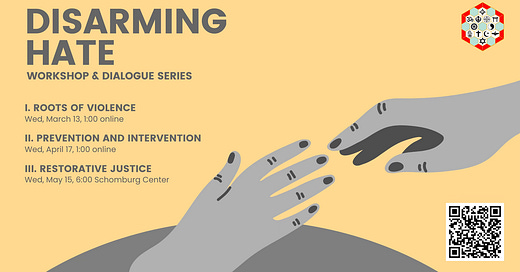Since our 2021 Marshall Meyer Retreat “New York Faith Communities Respond to Gun Violence,” ICNY has been committed to anti-gun violence and public safety advocacy. Though NYC has seen a decrease in gun-related crimes since the pandemic, we recognize a growing and alarming trend in hate-crimes and biases — a critical component we must address in our public safety programming. There is a demonstrated need to respond to various forms of hatred and bias embodied in xenophobia, stereotypes, and prejudice.
Trusted faith leaders are often the first stop for intimate issues among the community, making them uniquely positioned to interrupt cycles of harm and violence. ICNY’s three-part “Disarming Hate” series equips diverse faith leaders with an opportunity to address what we have identified as three main pillars of public safety: 1) understanding the root causes of violence, 2) prevention and intervention strategies, and 3) restorative justice. In each segment, we bring in key partners (e.g., cure violence organizations, violence interrupters, religious leaders and public advocates) to bring refreshed vocabulary, methods, and advocacy tools to address violence in our communities
With each segment of the series, participants will receive a resource guide with suggested action and advocacy steps. This curriculum will form a tangible, shareable resource that will continually encourage community members to connect with our anti-violence community partners and prioritize public safety in their activism.
Part I: Roots of Violence
Wednesday, March 13 at 1:00-2:00 pm (online)
“Roots of Violence” will be a virtual panel exploring the root causes of harm and various types of violence (e.g., physical, psychological, spiritual, etc.). Speakers will explain concepts of power and choice, so participants can analyze not only how violence manifests in their communities but also why. Further, by reflecting on our language around “crime” and “violence” collectively, participants will be better prepared to facilitate sensitive conversations on hate and prejudice in their communities.
Speakers: Rana Abdelhamid (Malikah) and Danielle Williams (CONNECT)
Recording link [Passcode: &sYGgh@6]
Part II: Prevention and Intervention
Wednesday, April 17 at 1:00-2:00 pm (online)
“Prevention and Intervention,” connects faith leaders with methodologies and organizations working to eliminate violence. Participants will learn of various prevention strategies, such as youth mentorship programs and walking ministries. With these newfound connections, faith leaders can then invite anti-violence activists into their houses of worship or community spaces for subsequent conversations around public safety with greater attention to the unique needs of their neighborhood.
Speakers: Nova Felder (Bridging Africa and Black America - BABA), William Evans (Institute for Transformative Mentoring), and Apostle Dr. Staci Ramos (Garden of Gethsemane Ministries)
Recording link [Passcode: 08^q90.K]
Part III: Restorative Justice
Wednesday, May 15 at 6:00-7:30 pm (Schomburg Center for Research in Black Culture)
515 Malcolm X Blvd, New York, NY 10037
"Restorative Justice” will be an in-person event at the Schomburg Center in Harlem. The program will bring together participants from Parts I and II into the same room to explore restorative justice and advocacy. This segment harnesses the pastoral skills of faith leaders and faith-based organizations to encourage transformative and intergenerational healing. After participating in restorative justice practices (e.g., healing circle), attendees will reflect which parts of their practices (and theology, if applicable) are “roadblocks” and “resources” to better understand and transform the trauma in their community into renewed energy.
Speakers: Anooj Bhandari (Restorative Justice Initiative), Markie Bledsoe-Grant (NYS Division of Human Rights - Hate and Bias Prevention Unit), Joan Pangilinan-Taylor (NYS Division of Human Rights - Hate and Bias Prevention Unit)
What are some questions you would like to explore in this series?



